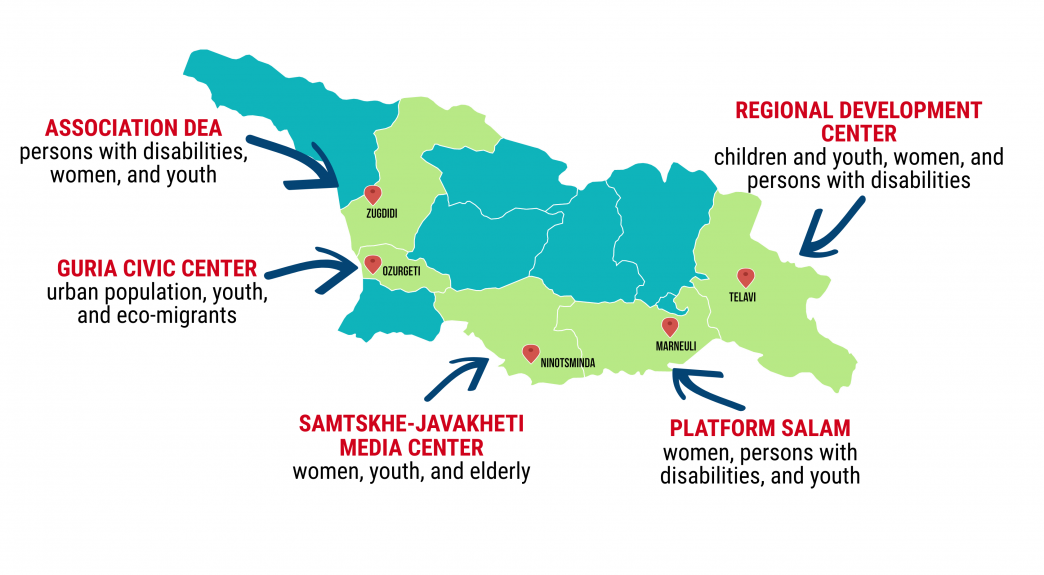Ahead of the 2021 local elections in Georgia, NDI supported civil society organizations (CSOs) work to ensure that the needs of citizens did not get drowned out by an electoral environment otherwise consumed by political rivalries and controversy.
Since October 2020, Georgia has been embroiled in a political standoff between ruling and opposition parties. Rather than providing an opportunity for robust public discourse on local issues and the parties’ respective proposed solutions, municipal elections became a referendum on the ruling party’s mandate and national disagreements. This led many Georgians to become disenchanted and disengaged from politics.
With support from the United States Agency for International Development (USAID), NDI assisted five partner CSOs from five of Georgia’s municipalities to secure public policy responses from political parties and candidates on issues affecting underrepresented groups, including healthcare access and agricultural promotion
Beginning in spring 2021, civic partners mobilized and empowered traditionally underrepresented groups representing women, youth, ethnic and religious minorities, people with disabilities and ecological migrants to share and engage with local candidates.
As the local elections neared, CSOs and their corresponding initiative groups engaged candidates and political parties about their local priorities; facilitated issue-based public discussions; and tracked commitments made by candidates and party leaders.
Local activist asking a question about a pressing issue to the political party candidates during a public discussion organized by Regional Development Center and Eastern European Center for Multiparty Democracy in Telavi.JPG
Local CSOs and media organizations organized and publicized candidate forums. Participants asked candidates about their vision and local concerns. Responses were then shared with the general public across a variety of print media, television and radio.
CSO pressure on candidates led to more issue-driven discussions at the local level. The CSOs prepared monitoring reports that highlighted issues of public concern that all parties committed to resolve. These reports also revealed some areas of potential cross-party collaboration, such as increasing youth employment and employment among persons with disabilities, supporting women’s economic development, reconstructing recreational spaces, and ensuring greater political participation of underrepresented groups in Zugdidi and Telavi.
The ruling party representative signing a joint declaration of political parties and civil society organizations on fostering citizen engagement and issue-driven decision-making..JPG
In Ninotsminda and Ozurgeti, CSO advocacy had a direct influence on candidates’ campaign promises – including several who were eventually elected as mayors. Candidates committed to building kindergartens in Ninotsminda villages; increasing access to quality and affordable services and medicine; and renovating recreational facilities. Developing a general city plan, improving municipal transportation and extending water infrastructure were among other promises voiced by candidates in Ozurgeti. A pledge to offer translation services in Marneuli serves as an important step towards solving language barrier issues in an ethnically diverse municipality. After the elections, CSO partners facilitated follow-up public discussions to remind newly elected officials and the public of key pre-election promises; and to foster joint action towards resolving the existing needs of local communities.
By facilitating issue-based discussion and tracking promises made by candidates and parties, civic groups laid the groundwork for post-election civic monitoring and increased cooperation between political actors and underrepresented communities. Through their efforts, civic groups also elevated voices and issues that often go unnoticed by political actors, contributing to more inclusive political party platforms. In 2022 and beyond, NDI will continue its partnership with CSOs and initiative groups in Georgia to monitor the implementation of commitments to increase accountability in local government.
NDI's engagement in Georgia is implemented with support from the United States Agency for International Development (USAID) through the Consortium for Elections and Political Process Strengthening (CEPPS).
Authors: Nino Bolkvadze is a Senior Program Manager on the Eurasia Team, Mariam Baramidze and Tamar Urushadze are Program Officers on the Eurasia Team and Giorgi Kakabadze is a Program Assistant on the Eurasia Team.



